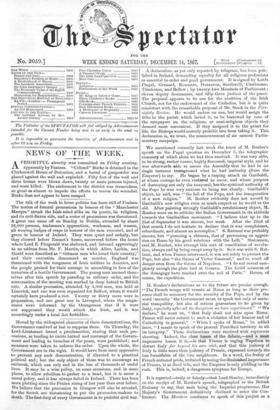We mentioned cursorily last week the tenor of M. Rouher's.
speech on the Papal question on December 5, the telegraphic summary of which alone we had then received. It was very able,. in its strong, rather coarse, highly flavoured, imperial style, and he was afterwards able to assure the Assembly that he had in no single instance transgressed what he had authority (from the- Emperor) to say. He began by a rasping attack on Garibaldi, at whose courage he even voltamd to sneer, and whose purpose- of destroying not only the temporal, bat the spiritual authority of the Pope he was very anxious to bring Out clearly. Garibaldi's object, he said, was "the fall of the Pope, and the inauguration of a new religion." M. Rouher evidently does not accord to Garibaldi's new religion even as much respect as he would to the old. After painting strongly Garibaldi's revolutionary object, M. Rouher went on to criticize the Italian Government in its attitude towards the Garibaldian movement. "I believe that up to the 21st of September it was sincere, but weak. After the 22nd of that month I do not hesitate to declare that it was complaisant, subordinate, and almost an accomplice." S. Rattazzi was probably sincere, but "pursuing a chimera, that of preventing an aggres- sion on Rome by his good relations with the Left." Statesmen, said M. Rouher, who attempt this sort of conciliation of revolu- tion, always end by being swept away by it. So it was with S. Rat- tazzi, and when France intervened, it was not solely to protect the Pope, but also "the throne of Victor Emanuel," and to ward off danger even from the throne of Napoleon. "I do not reveal com- pletely enough the plots laid at Geneva. The fostid miasmas of the demagogy have reached even the soil of Paris." Hence, of course, the expedition.






































